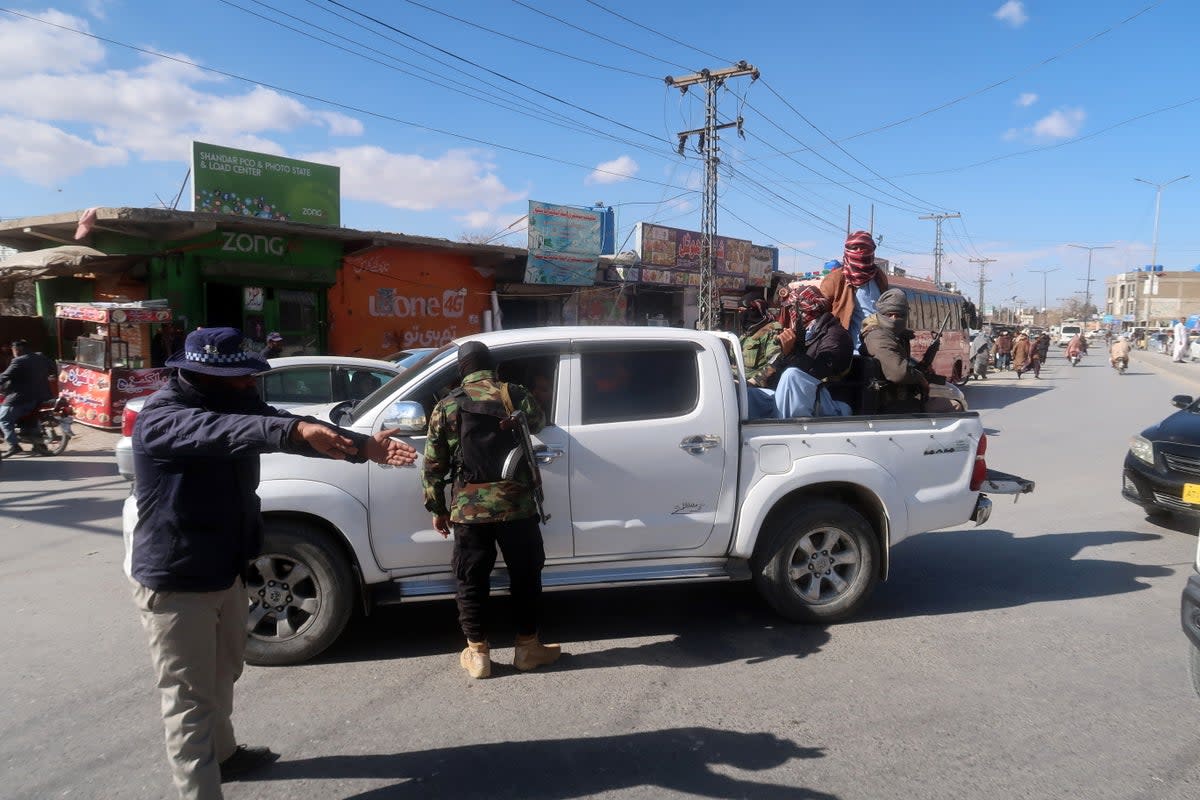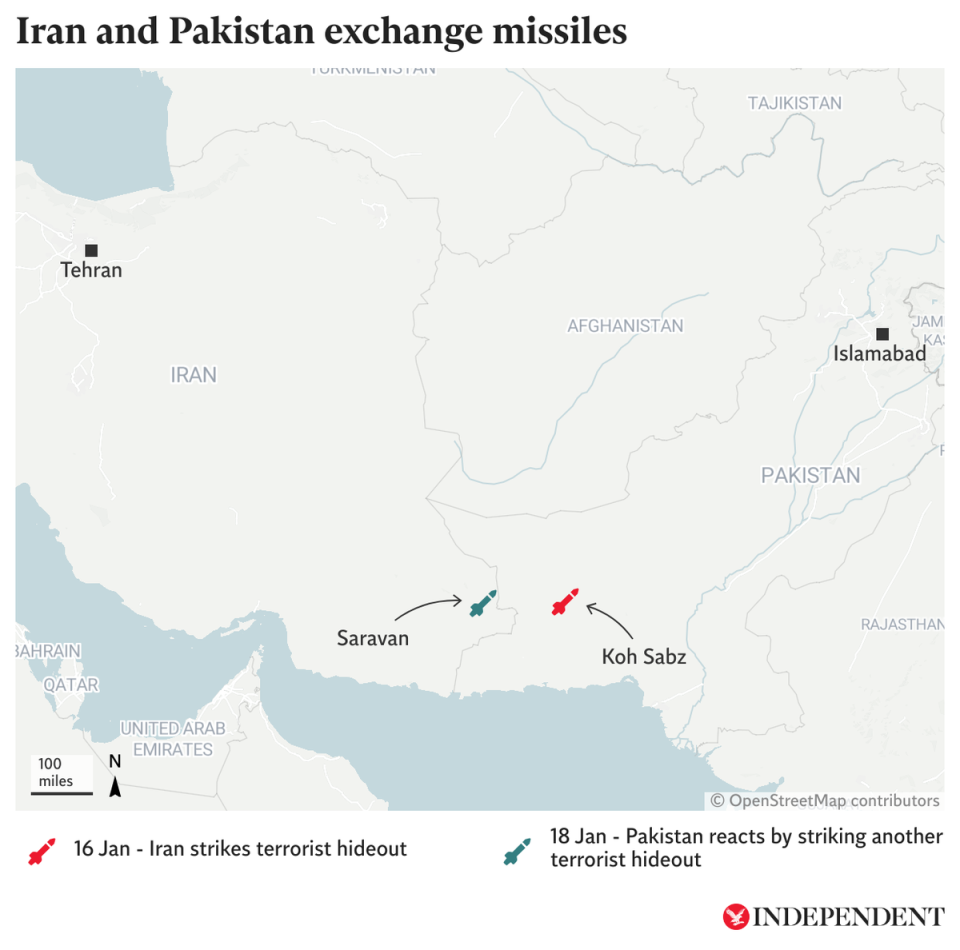Why are Iran and Pakistan striking each other’s territory amid crisis in Middle East?

Pakistan and Iran launched air strikes into each other’s territories this week in most significant escalation of tensions between two neighbours, inflaming the already strained ties at a time of rising turmoil in the Middle East.
The latest developments are threatening to escalate into a major conflict in the region and spiral out of control as rising tensions in the Middle East with the Israel-Hamas war are having repercussions all over the world despite intensified diplomatic efforts.
The risk of unprecedented escalation is exacerbated as Iran had been flexing its muscle in the region even before it hit Pakistan.
Iran conducted airstrikes on Syria against what Tehran said were Islamic State sites and Iraq, where it said it had struck an Israeli espionage centre.
Iran and Pakistan – sharing a 900km (559-mile) long volatile border – have a long history of fighting militancy with restive Balochistan province on one side of the border and Iran’s Sistan on another.
The situation is heating up as the US and UK launched strikes on Iran-backed Houthi rebels in Yemen, who had been targeting vessels in the Red Sea over Israel’s assault on Gaza.
The Israel-Gaza war has continued for more than 100 days since 7 October attacks by Hamas on Israel, inflaming the long-standing conflict to dangerous levels while Tel Aviv also fought with Iran-backed group Hezbollah across the Lebanon border.

What we know so far
It began on Tuesday with Iran launching strikes on Pakistan’s Balochistan province, killing two children and causing injuries to three others, according to Pakistani authorities. Iran claimed it targeted Jaish al-Adl, the Sunni separatist group.
Iran claimed that its strikes “only targeted Iranian terrorists on the soil of Pakistan” and that no Pakistani citizen was the target of its strikes.
But Islamabad condemned the attack furiously, calling it an “illegal act” and "unprovoked violation of its airspace by Iran".
“This violation of Pakistan’s sovereignty is completely unacceptable and can have serious consequences,” a foreign office spokesperson said.
It prompted the Pakistani government to recall its ambassador to Iran and blocking the envoy from returning.
Two days later, on Thursday, Pakistan conducted retaliatory airstrikes in Iran, apparently targeting militant hideouts, killing at least nine people and injuring others.
Pakistan used its "killer drones, rockets, loitering munitions and stand-off weapons” in the strikes, according to Inter-Services Public Relations (ISPR), the media wing of the military.
The operation was given a code name “Marg Bar Sarmachar” which means “death to guerrilla” in Iranian Farsi. It is a famous saying in Iran since its 1979 Islamic Revolution used to refer to both the United States and Israel.
Pakistan reportedly used Chinese-built fighter jets JF-17 ‘Thunder’ and J-10C’ Vigorous Dragon’. The JF-17 Thunder fighter jets belonged to the Number 2 ‘Minhasians’ Multirole Squadron from the Pakistan Air Force (PAF).
Following the attacks, Islamabad attempted to dial down the tensions and said it conducted “a series of highly coordinated and specifically targeted precision military strikes” in the Sistan-Baluchistan province.
It added: “Pakistan fully respects the sovereignty and territorial integrity of the Islamic Republic of Iran.
“The sole objective of today’s act was in pursuit of Pakistan’s own security and national interest, which is paramount and cannot be compromised.”
Pakistan said it struck militant hideouts of Baluch Liberation Army, an ethnic separatist group that’s operated in the region since 2000.
The group confirmed in a statement that the strikes killed its people and vowed that “Pakistan will have to pay a price” for it.
"Now the Baluch Liberation Army will not remain silent. We will avenge it and we announce war on the state of Pakistan."
Who are the militants targeted by Pakistan?
Both Tehran and Islamabad targeted militant groups that operate in the area that includes Pakistan‘s southwestern province of Balochistan and Iran‘s southeastern Sistan-Baluchestan province. Both are restive, mineral-rich, and largely underdeveloped.
Pakistan said it struck militants of the Baluch Liberation Army (BLF) which is waging an armed insurgency against the Pakistani state.
Formed in 2000, the ethnic Baloch rebels say they are fighting the government in Pakistan for better share of resources and self-autonomy and demand a separate state.
The group has claimed that the the central government unfairly exploits the province’s rich gas and mineral resources of Balochistan province, which borders Afghanistan and Iran.
The western province of Balochistan in Pakistan is a vast province of roughly 15 million people is mostly arid desert and mountainous territory holding untapped mineral wealth.
It is Pakistan‘s largest of the four provinces by size, but the smallest by population.
It has strongly opposed the China-Pakistan Economic Corridor (CPEC) and blamed it for targeting the projects and occasionally killing Chinese workers despite Pakistan‘s assurances that it is doing all it can to protect the Chinese projects.
They have been also blamed for attacks on gas projects, infrastructure, and security posts there.
Who did Iran target in Pakistan?
Iran said it targeted two bases of a Baloch Sunni militant group, Jaish al-Adl, in Pakistan.
Jaish ul-Adl, also referred to as Jaish al-Adl meaning “Army of Justice” in Arabic, is a separatist militant organisation that mainly comprises of the Sunni militant Jundullah group, which was weakened after Tehran launched a crackdown it, arresting most of its members.
The anti-Iranian group that is predominantly active in Southeastern Iran has been waging rebellion to seek independence from Iran’s eastern Sistan and Pakistan’s southwestern Baluchistan provinces.
It was formed in 2012 by former members of Jundallah, whose head Abdol Malek Riki was executed in 2010.
Jaish al-Adl has been designated as terrorist organisation by Iran, Japan, New Zealand and the US.
The group whose members are from the ethnic Baluch community and live on both sides of the border have strongly opposed Iranian involvement in Syrian civil war.
Iranian state media has often blamed the US and Saudi Arabia for backing these outfits for carrying out attacks against the leadership in Iran. The government has also blamed Pakistan for harbouring the terrorists, a claim Islamabad denies.
Pakistan insists the group has no organised presence in the province or elsewhere but acknowledges that some militants might be hiding in remote areas of Baluchistan, which is the country’s largest province by area and its most sensitive because of a long-running insurgency.
Additional reporting by agencies

